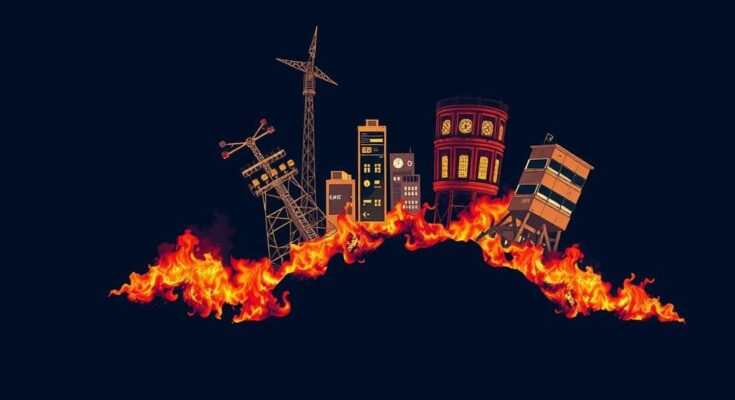Cuba faces a multifaceted crisis, marked by a recent nationwide blackout stemming from a fragile power grid and ongoing economic despair. The nation is experiencing severe food and resource shortages, compounded by a tightened US trade embargo. High inflation has led to public protests and fueled a mass emigration crisis, reflecting deep-seated dissatisfaction among the citizens.
Havana has plunged into chaos following a significant blackout triggered by a failure in its power grid, exacerbating a multitude of long-standing crises such as economic downturns and poorly maintained infrastructure. Recent weeks have already subjected Cubans to prolonged power outages, at times lasting up to 20 hours each day, leading to a complete shutdown of non-essential public services, school closures, and inoperable traffic lights in the capital. The root cause of this nationwide blackout can be traced to a frail energy infrastructure that relies heavily on fossil fuels, which meets only one-third of the island’s electricity demands, as reported by the government. The acute energy dilemma has been intensified by difficulties in acquiring fuel, primarily influenced by the US trade embargo that has tightened under recent administrations. Cuba’s electricity generation relies predominantly on eight aging coal-fired power plants—many of which have been functioning for over four decades—thereby resulting in frequent failures and ongoing repairs. In an attempt to stabilize its failing grid, the Cuban government has procured seven floating power plants from Turkish firms and installed numerous small diesel generators. Furthermore, Cuba has long depended on oil imports from Venezuela, which has been diminishing in recent months, with reported deliveries plummeting from an average of 33,700 barrels per day in June to roughly 22,000 barrels in September. Efforts are in place to transition towards renewable energy. However, progress is hindered by insufficient investment and the resulting impact of the US embargo. Cuba faces its most severe economic challenges since the dissolution of the Soviet Union, characterized by rampant inflation and shortages of essential goods, including food, medicine, fuel, and water. The authorities attribute a significant portion of these difficulties to the US embargo, which compounds the effects of economic mismanagement and the ramifications of the Covid-19 pandemic, particularly impacting the beleaguered tourism sector. In July 2021, mounting frustrations over blackouts and soaring food costs triggered widespread protests across the country, with demonstrators expressing dissatisfaction by chanting, “We are hungry” and “Freedom!” These protests resulted in casualties and arrests, leading to continued unrest over power issues in subsequent years. Notably, during protests in March 2023, citizens in Santiago de Cuba and other cities again voiced their demands for essential resources. As disillusionment festers among Cubans, a significant wave of emigration has commenced, marking the largest exodus since Fidel Castro’s revolution in 1959, with over 700,000 individuals having migrated to the United States between January 2022 and August 2024. By 2024, the population is projected to decrease to less than 10 million, reflecting a comprehensive trend of despair and the search for better opportunities abroad.
Cuba’s current trajectory reflects a convergence of systemic issues that have compounded over decades, particularly since the end of Soviet support. The island’s infrastructure has suffered from neglect, leading to public unrest driven by a failing economy, reliance on outdated technology, and increased isolation due to geopolitical tensions, particularly with the United States. The power grid’s fragility has been a pressing concern, reflecting broader economic challenges, including the impacts of the US embargo, which has hindered access to resources necessary for both infrastructure maintenance and fuel acquisition. Under these pressures, the nation has seen both social unrest and a marked increase in emigration as citizens seek better prospects.
In summary, Cuba is grappling with an array of challenges stemming from an unreliable energy infrastructure and severe economic instability, further exacerbated by external political pressures and internal mismanagement. These issues have ignited public dissent and prompted large-scale emigration as citizens seek to escape pervasive hardship. The situation underscores a critical need for transformative changes within the nation’s economic and infrastructural frameworks to forge a more sustainable future for its populace.
Original Source: jordantimes.com




